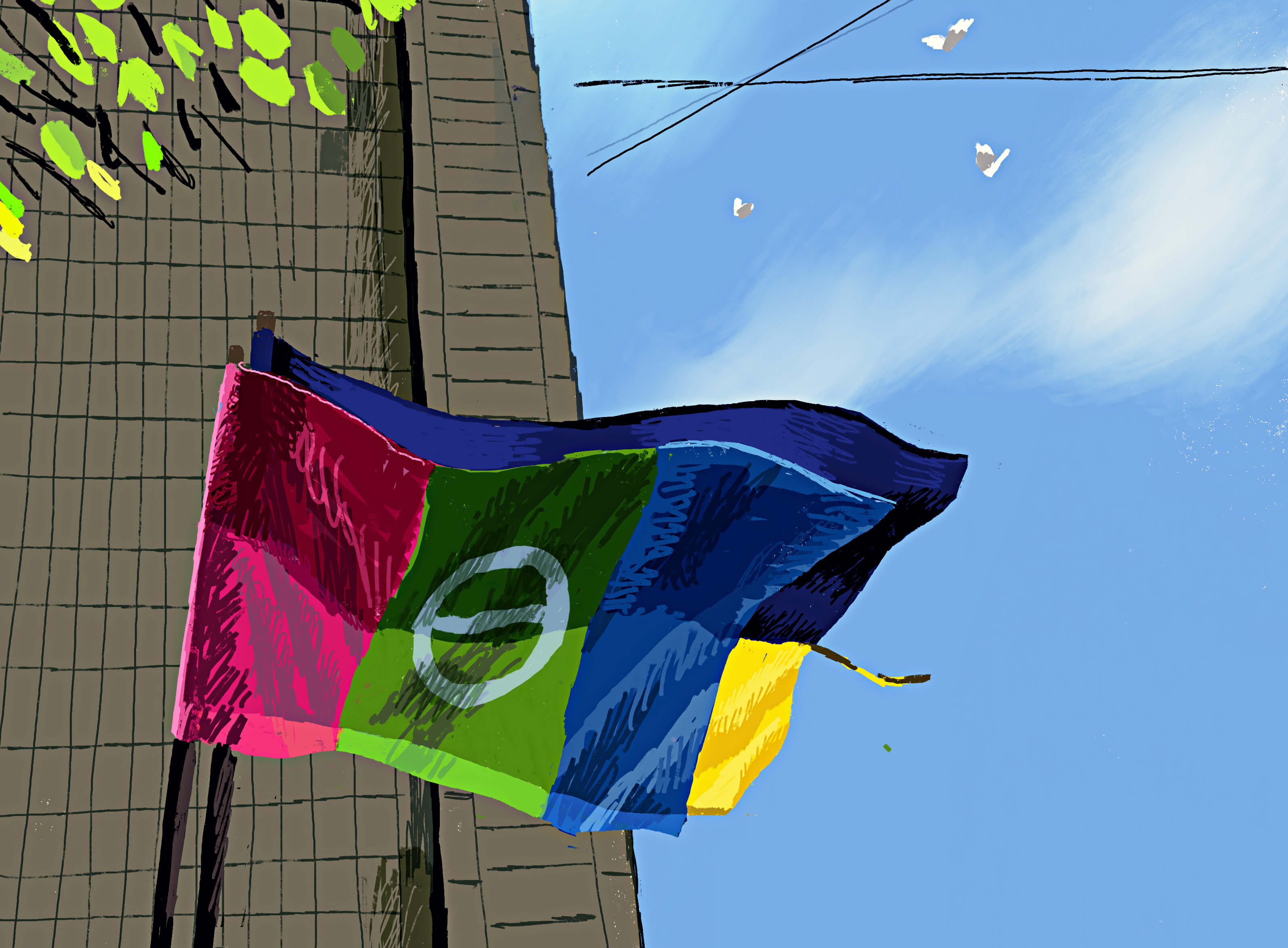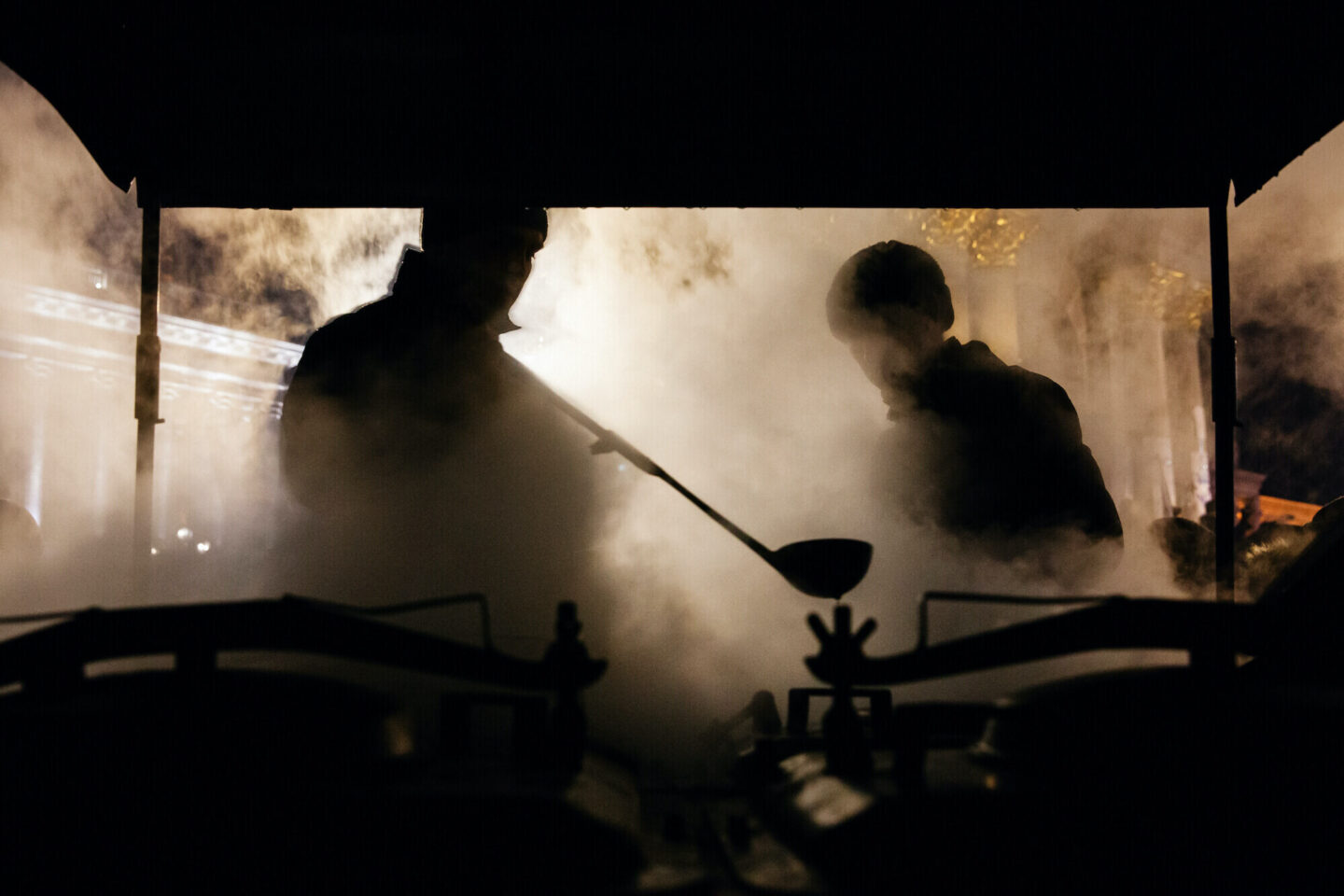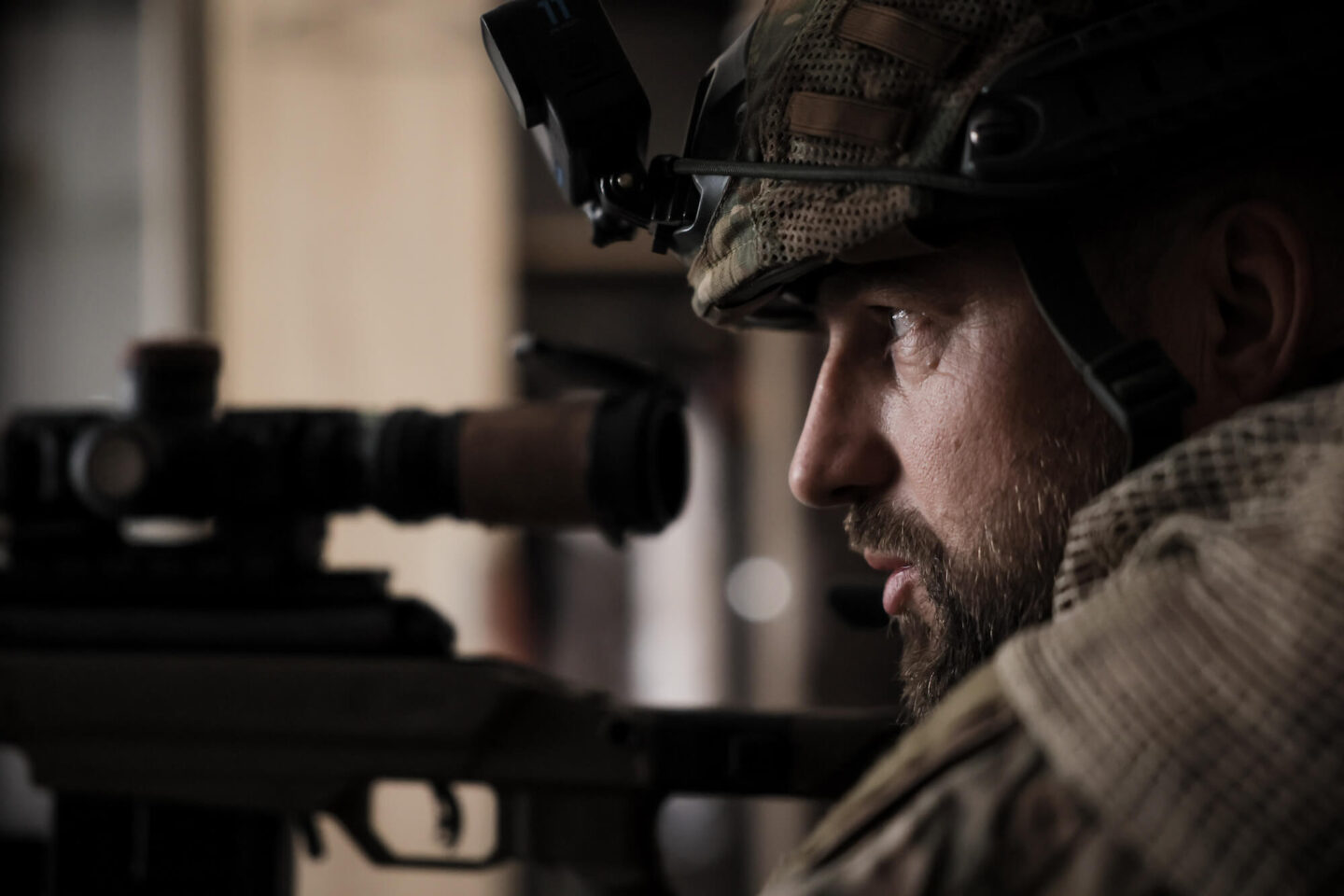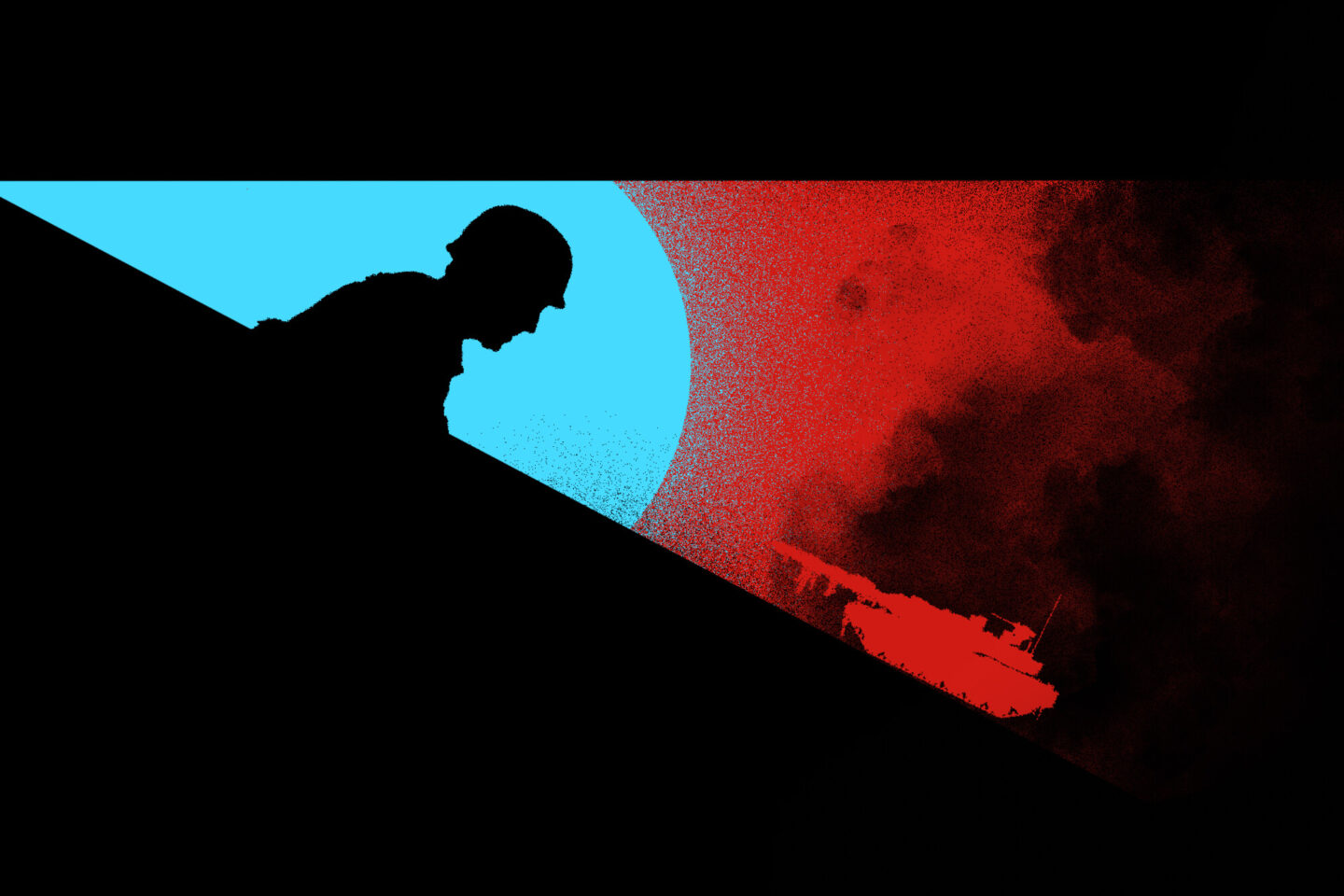Here, they don’t say “patients”; they say “clients.” So, one of the clients has back pain.
The client is about the same age as her family doctor, Tetiana. Their age is private information, but it’s clear that the doctor has been working for around half a century.
Tetiana squints through thick, bulging lenses in a purple frame and quickly types the symptoms into her computer. The computer used to scare her when healthcare reform began, and everyone had to master using it. However, it turned out to be manageable. Fear has many faces, so even our backs react differently, say, to a spider in the corner versus the sound of a Russian plane about to drop a bomb.
“Your back, back… What about here if I press?”
“Oh, it hurts everywhere. Here, here. And you, sorry, where did you live?”
“On Chaikovskoho Street, almost next to our clinic. And you…” The doctor doesn’t even ask.
“Same as everywhere.”
This conversation begins in the Darnytskyi district of Kyiv at a small primary care clinic from Bakhmut.
Back pain aside, both the client and the doctor feel the same pain—a pain of a perfectly healthy heart. It aches for home.
Salt
The battles for Bakhmut kept getting tougher. Even the staff at the Bakhmut Center for Primary Care, who had previously refused to leave, began to evacuate. Those who left found themselves without work and with only a fraction of their salary—marked “idle time”. Some sought new jobs, some went abroad. Center Director Svitlana Shabalina kept thinking about their hospital in Bakhmut. Waiting is possible, but how to live now?
That’s when Svitlana began calling colleagues.
“We’ll start anew.”
Fifty-year-old Svitlana shows the way to the Bakhmut clinic in Pozniaky, which she manages. A small building tucked away behind a typical high-rise in the capital. Normally it’s easy to find, but today the wind has wrapped around one of the flags.
On that flag, there should be three colors: crimson, green, and blue, with a white circle in the middle, split by a horizontal line. Sometimes people confuse it, thinking it’s the chemical symbol for salt, but it’s actually alchemical. Ancient alchemists considered salt one of the three primal substances. For Bakhmut, salt is also something elemental. After all, when the artillery shellings halted production at the Artemsil plant and salt disappeared from store shelves, Ukrainians might recall Bakhmut the same way the fairy-tale king remembered his daughter who loved him “like salt” but wasn’t understood.
“We need to unwrap it so our people don’t get lost,” Svitlana says, carefully opening the door, glancing back at the flag.
Svitlana can list exactly the order in which the Russians destroyed clinics and medical outposts around Bakhmut. First, in the village of Vidrodzhennia south of Bakhmut, then in Pokrovske and Zaitseve. Then the sixth clinic on the outskirts, near the champagne factory; then the ninth, third, fifth, second, and seventh. The first and eighth clinics in the center had been holding the longest. The last she heard, the first clinic was still standing, fully intact.
The fighting for Bakhmut intensified in the summer of 2022. Family doctors, therapists, and pediatricians initially worked in offices and then in basements. Eventually, those unwilling to stay under occupation had to leave.
Goal
“It’s not Bakhmut, that’s for sure.”
“It’s not like in Bakhmut here.”
“In Bakhmut, it’s different.”
“It’s a pity I can’t show you how it is in Bakhmut.”
Svitlana repeats this over and over. The exam room isn’t quite the same. The offices, tables, walls, ceilings, even the light is coming through the windows differently. Svitlana found the space in Pozniaky through colleagues; initially, there were just two rooms, but now they’re slowly expanding.
It’s a rather tight clinic inside a residential building, with a layout to match. But Svitlana knows they’ll make it just as exemplary as before.
When the primary care reform began in 2018, the team of Minister Ulyana Suprun and National Health Service of Ukraine (NHSU) Director Oleh Petrenko expected the best results from big cities rather than small district centers, especially those just 15 kilometers from the front lines. Yet, it was the small towns that took the first initiative. Bakhmut’s center, where most employees were already eligible for retirement, embraced the reform immediately.
After receiving the first funds from the NHSU, the staff decided to renovate the offices first, making them spacious and bright, and buy new equipment. With the upgrades underway, the clinic began increasing salaries and setting aside money for training and internships for its medical staff.
“My greatest pride is our hub, our training room,” Svitlana says, gesturing somewhere, as though to show it.
It’s a large room where doctors could gather for lectures, discuss complex cases encountered during the week, consult each other, and simply share tea together. They also began holding training sessions for doctors and first aid courses for civilians here.
“At first, I had to practically drag them to the room—’Let’s talk, hold a session, invite a specialist for a lecture.’ Then one day, as I passed by, I saw a lively discussion happening. And I hadn’t initiated it. That’s when I knew—we’re going to be just fine.”
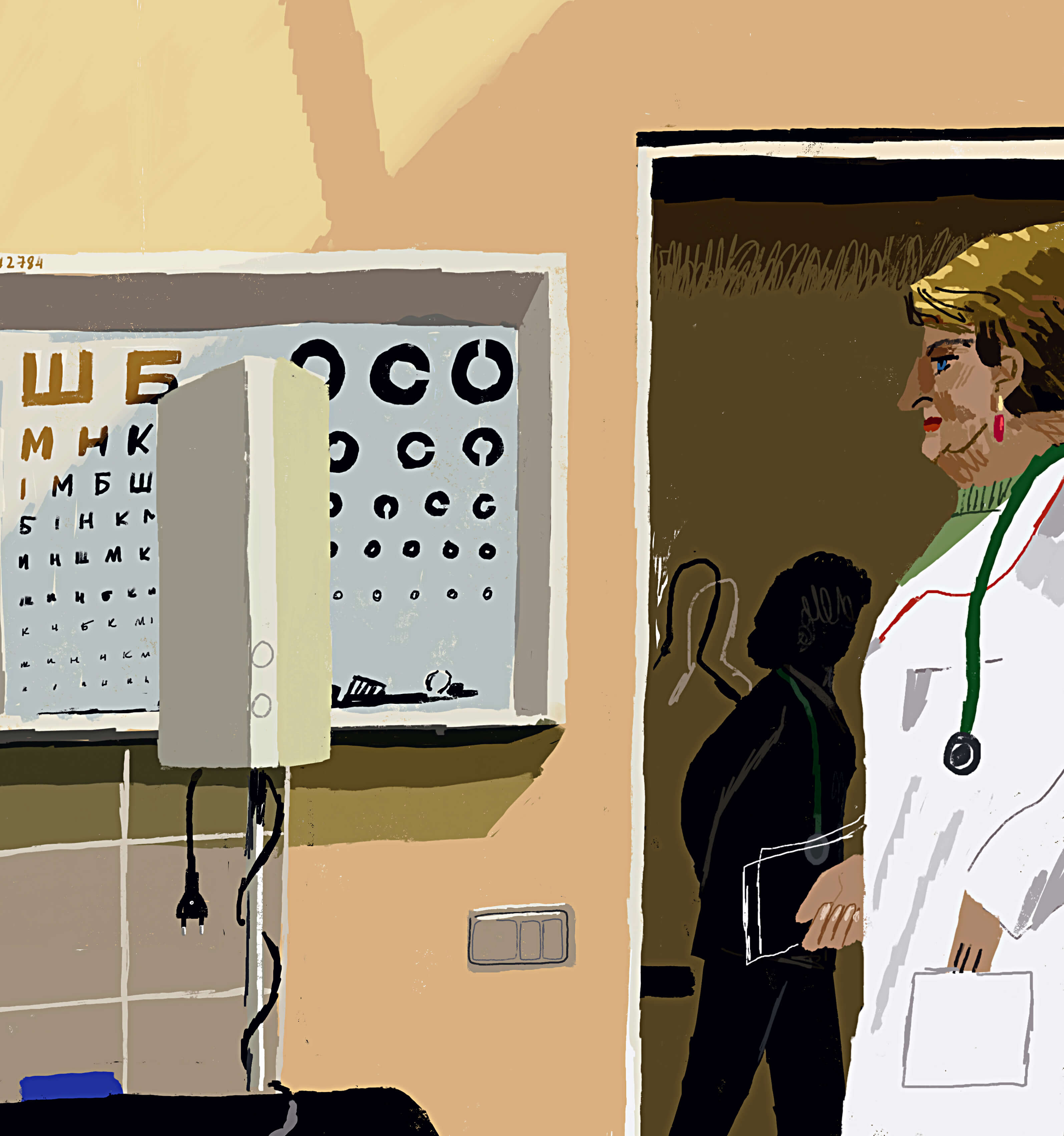
Role
Back during her internship, Svitlana knew she’d return to Bakhmut. After all, her entire family lived there, and she couldn’t stand the bustling, expensive Donetsk. Besides, Svitlana liked a challenge. Why not be a successful specialist in a small town?
Svitlana returned to Bakhmut as a pediatric gynecologist—an insane rarity for district centers in the ’90s. Hospitals didn’t even know specialists like her existed.
“Oh, why would a little girl need a gynecologist?” they would exclaim. “Surely, girls don’t have pathologies, and heaven forbid, pregnancies?”
Svitlana had to teach her colleagues what signs should prompt them to refer a young girl to a pediatric gynecologist. She worked to ensure she wasn’t feared by young girls and to stop nurses from persuading parents to decline examinations. Those same nurses needed reminding that “yes, pediatric gynecology also needs an exam table and gloves”. But for a long time, Svitlana would come to work and find only one glove waiting.
“Why only one?”
“Well, you’re a pediatric gynecologist,” the nurse would answer, leaving Svitlana to interpret it however she wanted.
When she began working, she was quickly called to management. Why did so many girls suddenly appeared to have diagnoses?
“It was a nightmare! I had to explain they hadn’t ‘appeared’ but had been there all along, just undiagnosed! When I was 28 and brought to the maternity ward, they labeled me ‘elderly primigravida.'”
It’s a medical term, meaning a woman giving birth for the first time at an advanced age. Svitlana could have explained what was wrong with that “diagnosis,” but in the maternity ward, a gynecologist also becomes a simple woman who’s scared.
Svitlana is an evidence-based doctor. She can’t stand messy prescriptions of antibiotics, hormones, homeopathy, and—most of all—doctors who prescribe homeopathy. Pharmacology was a tough subject for her, so she studied it from beginning to end.
“So how can I prescribe a herbal pill that, in its dosage, wouldn’t even cause an allergy?”
Svitlana loved being a doctor, but at some point, she realized she was more interested in organizing work for her colleagues, in being a manager. So, when the clinic head offered her a deputy position, she accepted, even though no one else wanted it. The thing is, clinics are always to blame for everything. In hospitals, everyone’s an expert, but clinics “missed it, neglected it, overlooked it.”
“And I told my team: you’re no longer without support. Anyone’s problems—whether you’re the cleaner or the head of a department—I’ll handle it. Let any complaints be directed at me, and I’ll defend you!”
In that time, and it was the early 2000s, Svitlana began analyzing the reception queues and the exam rooms, pondering why some were full while others weren’t, and how to fix it. She started tracking processes in the clinic to simplify them, monitoring doctors with uncontrollably rising patient counts—was it a lack of preventive care, or was Bakhmut in a severe epidemic zone?
So maybe that’s why, when the Donetsk Oblast launched a pilot project in 2011 to separate primary from secondary care, Svitlana readily agreed to head the Primary Care Center, as narrow specialists often viewed therapists as “not real doctors.”
“They’d say, ‘Primary care doesn’t know anything.’ Right. It’s primary care that handles 80% of client complaints, yet it was tough to get that message across to the higher ups. When Uliana [Suprun — Ed.] came and said healthcare reform was inevitable, I said, ‘We’ll do it. Let’s start preparing!'” Svitlana speaks so passionately that I imagine she should stand on a pedestal in her clinic, with applause filling the room after her words.
Destroyer
The first time was different. Not as much destruction, not as many dead. Maybe the days after Debaltseve in February, when Bakhmut’s hospitals struggled to keep up with the wounded, were the closest you could compare to what happened now. That day, Svitlana was volunteering, delivering food and warm clothes.
A local journalist recalls Svitlana as one of those who never hid her pro-Ukrainian stance in Bakhmut. Her husband joined the army and fought in the ATO.
Bakhmut was first liberated on July 6, 2014, by the Artemivsk Battalion. When Svitlana heard, she grabbed a bottle of champagne and rushed to the hospital. The Ukrainian soldiers wanted to raise the flag at the ambulance station, but Svitlana intercepted them and suggested they do it at their hospital.
“That victorious flag is still with us.”
The second time was different—the war rolled in slowly at first, then crashed down, reducing Bakhmut to concrete and rubble.
Svitlana sensed something. Maybe because, on February 12, she went to the front to do COVID tests for the soldiers. They told her, “It’s tense on the other side. We don’t know what they’re planning, but it won’t be good.”
Then the full-scale war began, and so did the workday at the clinic. People hadn’t yet started leaving in droves, so rapidly; many were still clinging to the hope of a sudden, happy end.
Svitlana left Bakhmut in May 2022, when the battles were already underway, eventually becoming the fiercest in Bakhmut. She doesn’t hide that she couldn’t take it, that she was scared. She lost weight quickly, couldn’t even drink water, and one night caught herself sleeping curled up in a fetal position, as if searching for protection.
At first, the authorities asked all doctors to stay, but later allowed them to leave. Svitlana came to work and openly told her colleagues she couldn’t take it anymore and wanted to leave to work remotely. No one objected. Some planned to leave too, others aimed to stay as long as they could. The brutal battles for Bakhmut raged for ten months. Russia occupied the city in April 2023, just as Svitlana and her colleagues opened a clinic in Kyiv.
From Everywhere
A hotline from the Ministry of Health helped locate where their people were. The doctors called each of their patients to learn the essentials—where they were now. Most from Bakhmut had settled in Dnipro, Kyiv, and two respective oblasts. They decided to reopen in these cities.
“This is our island. All of our staff used to work in various clinics in Bakhmut. Now we have 26 doctors—all from Bakhmut. The administrator, the cleaning staff, even the intern. And we’ve managed to bring back our patients.”
The primary care center in occupied Bakhmut can’t operate, and the NHSU can’t send funds there.
“Hello, this is the Bakhmut Clinic. How are you? We’ve opened in Kyiv; you can renew your medical contract until we’re back in Bakhmut,” the doctors said over the phone.
“And the people? They were happy, grateful that someone cared. Some even came from other parts of the Kyiv Oblast to re-sign their contracts. Some cried when they arrived.”
Some Bakhmut residents who live nearby still haven’t renewed their declarations in Kyiv or Dnipro. It’s as if their declaration still resides in Bakhmut. But with the primary care center in Bakhmut unable to operate, they must update it to receive care at the Bakhmut center in Pozniaky. Why don’t they do it? For some, it could be laziness, lack of time, or reluctance. But on the Bakhmut island, there’s another point of view.
Those who come to the clinic without renewing their medical contract are still seen for free, even though the NHSU doesn’t cover these patients.
But it’s not about the money; it’s about a word, the last thread poised under a knife.
“You know, it’s not just a word—Bakhmut. For some, it’s a way of still holding on to the city. We don’t insist or push. This is our shared pain. Sometimes it takes time to gather yourself, even for just three lines on a piece of paper.”
Now, in the clinic, the walls are old, but the relationships are completely new—more familial. Consultations last a bit longer, but not because of health issues. People meet each other here, meet the doctors, and talk. About the city, home, loved ones, favorite parks, how they’re doing here, how they arrived, whom they lost. About the things that hurt, beyond lungs, knees, back, and joints.
At the entrance, Svitlana places the local Bakhmut newspaper, which comes out less often now but still comes out. So, people leave with both consultations and stories about themselves. Today, the wind tangled the flag, so Svitlana must straighten it so “our people will see it” when they come to share what hurts.
Patients sometimes say, “Oh, how good it was in Bakhmut.” Brighter, more open, easier. Distance only deepens the longing. When Bakhmut’s journalists asked Svitlana Shabalina how she imagined the rebuilt Bakhmut, she said, “The way it was.” Just maybe with a few more ramps.
Translation — Iryna Chalapchii
§§§
[The translation of this publication was compiled with the support of the European Union and the International Renaissance Foundation within the framework “European Renaissance of Ukraine” project. Its content is the exclusive responsibility of the authors and does not necessarily reflect the views of the European Union and the International Renaissance Foundation]

